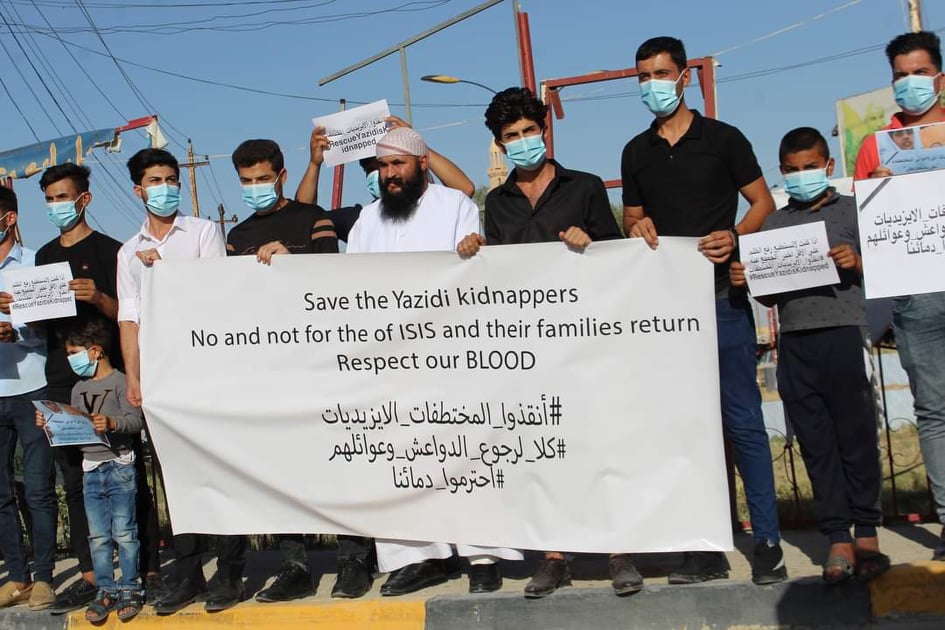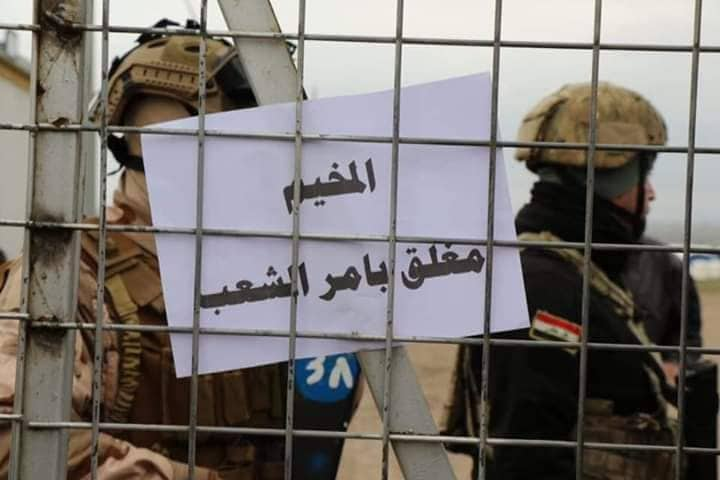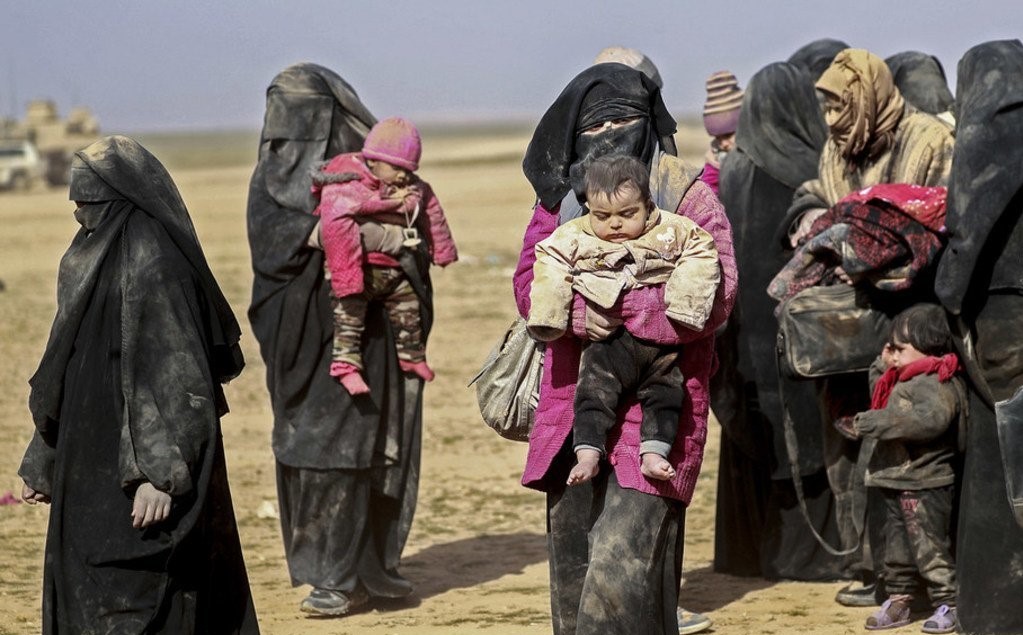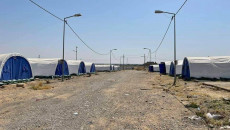Despite the absolute objections by the people of Ninewa province, yet it has failed to convert the federal government’s decisions regarding relocation of Iraqi families considered relatives of the extremist militants of the Islamic State of Iraq and Syria ISIS, from Syria to Iraq.
During the past few months, 10% of the Iraqi “ISIS families” were transferred from al Hol camp in Syria to Al-Jada’a camp in Ninewa, Iraq. Al-Jada camp, located in Ninewa province, was established last year to receive Iraqi women, children and relatives of the Iraqi militants of ISIS.
Al-Hol camp, east of al-Hasaka Kurdish province in northern Syria, is home for about 72,000 people affiliated to IS fighters, almost 30,000 of them are Iraqi women and children. Others are Syrian and other nationalities.
"We have organized protests several times and refused to return ISIS families. We asked not to return them in appreciation of sacrifices by families of the victims who were killed by ISIS, but the government did the opposite and paid no attention to the protests," said Khodida Jamil, an Ezidi (Yazidi) activist in Shingal (Sinjar) district, Ninewa province.
ISIS militants stormed Mosul and controlled almost one third of Iraq in 2014. Their crimes against the ethnoreligious Ezidi minority escalated to genocide when they beheaded over a thousand and buried them in tens of mass graves.
The extremist Islamist fighters accused the defenseless Ezidis of being devil worshippers, enslaving over 6400 women and children as sex slaves, half of them brought to unknown destiny and the rest were freed and reunited with their families living in poverty under tents in the IDP camps in the adjacent Kurdistan region of Iraq KRI.
Shingal and Shekhan districts of Ninewa were home to over half a million Ezidis prior to IS atrocities. 300,000 fled to the KRI and Shingal Mount and about 100,000 left Iraq forever.
"We believe that returning ISIS families to Ninewa is an insult to the Yazidis and the victims," Khudida added.
Last May, about 100 families was transferred from Syria to Iraq, and according to KirkukNow follow-up, about 450 families, were transferred to Al-Jada’a camp up today, making 10% of the total Iraqi families in Syria refugee camps.
"The total of Iraqi families in Al-Hol camp is 4,500 families, but only 450 families were transferred to Al-Jada'a camp," said Shirwan Dobardani, a member of Iraqi parliament from Ninewa who is following the case closely.

The 450 families that were transferred to Al-Jada'a camp consist of more than 1,480 people, 500 of whom are children and the rest are women.
"We brought the protests of the people of the region to the Iraqi government, but it did not pay attention to these protests and proceeded with its decision," according to Dobardani.
Al-Jada'a camp is less than 100 meters from the village of Al-Jada'a, which is 15 km from the center of Al-Qayyarah district, 60 km south of Mosul. The camp includes 500 tents and it is run by the Iraqi Ministry of Migration and Displacement and the International Organization for Migration IOM.
Qassem al-Araji, the Iraqi National Security Adviser, last March said in a symposium about Al-Jada camp refugees, that these families are transferred to Iraq from Syria following security and intelligence scrutiny according to special procedures, with the aim of reintegrating them into society and rehabilitating them psychologically and socially in preparation for their return their hometowns.
Al-Jad’a 1, in Ninewa province, used to be home for Iraqi families affiliated to IS members and was shut to push the residents to return home. Those who had social problems in their home towns have resorted to al-Jad’a 5 camp to escape tribal retaliation from the locals.
The Iraqi government was planning to close all the camps across the country including al-Jad’a camp home for 1300 families, among them 950 families of ISIS militants. 14 out of 15 IDP camps in Mosul built for the displaced whom fled ISIS atrocities in 2014 and families of IS fighters, were shut.
The plan was successful to reintegrate 66,000 families into their communities in a voluntary and smooth process, Evan Gabro, the Iraqi ministry of migration said in February.
we have told the officials in the Iraqi government they would make a huge mistake
Ali Omar Gabo, Deputy Governor of Ninewa for Affairs of IDPs and Organizations, told KirkukNow, "we have told the officials in the Iraqi government they would make a huge mistake if they move these families to Ninewa but they did not listen to us."
In previous years, the return of people accused of collaborating with ISIS sparked protests in different areas of Ninewa, which spread to tension and clashes.
Gabo explained that three groups have been transferred to Al-Jada'a camp, and that "the Iraqi government says that they have no security problems, but we do not know what will happen tomorrow."
The Iraqi government is currently making preparations to transfer another thousand families from Al-Hol to Al-Jada'a , in two groups, following the security procedures.

"The government is arguing that these are Iraqi citizens and they should be returned to their country, as 10% of those who were relocated are from Ninewa, and the rest are from Anbar and other provinces," Dobardani said.
"I do not imagine that any person or a particular entity will be able to change their view of ISIS, although government officials hope to do so, but I see that it is very difficult."
In 2019, the Iraqi government decided to establish the Al-Omla camp in Zummar district, northwest of Nineveh, to receive "ISIS families", but the project was halted due to the escalation of protests by residents and officials in the area.
An official at the Ministry of Migration and Displacement, who asked to stay anonymous, told KirkukNow, "Al-Jada'a camp is a temporary place and the displaced will be integrated into the community and returned to their areas of origin according to a special program," but he did not hide the fact that "there are no guarantees that they will not be exposed to these families have problems with the people in their areas, even if it turns out that they have no ties to ISIS, because their relatives were previously with ISIS.”
The United Nations seeks, through the formation of a number of committees, in cooperation with security and administrative officials and heads of clans, to promote resilience and reconciliation in order to pave the way for the return of people who were linked to ISIS militants or accused of affiliation to the extremist group.






